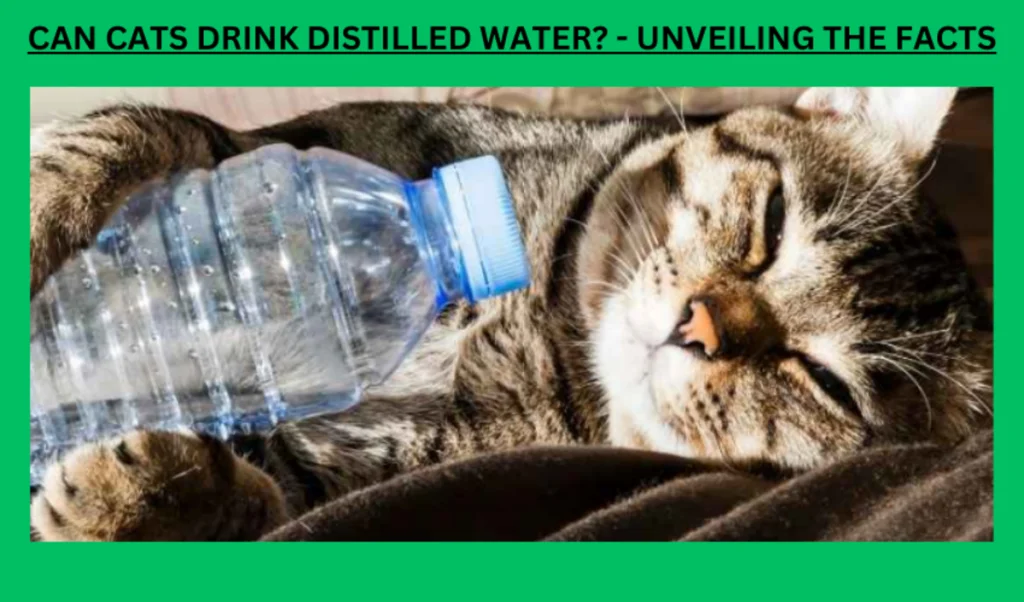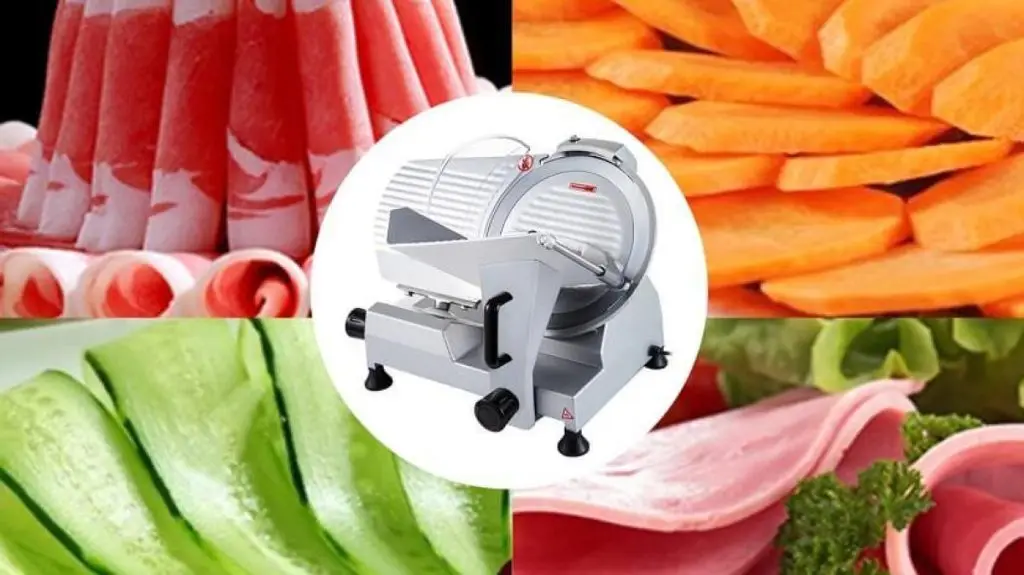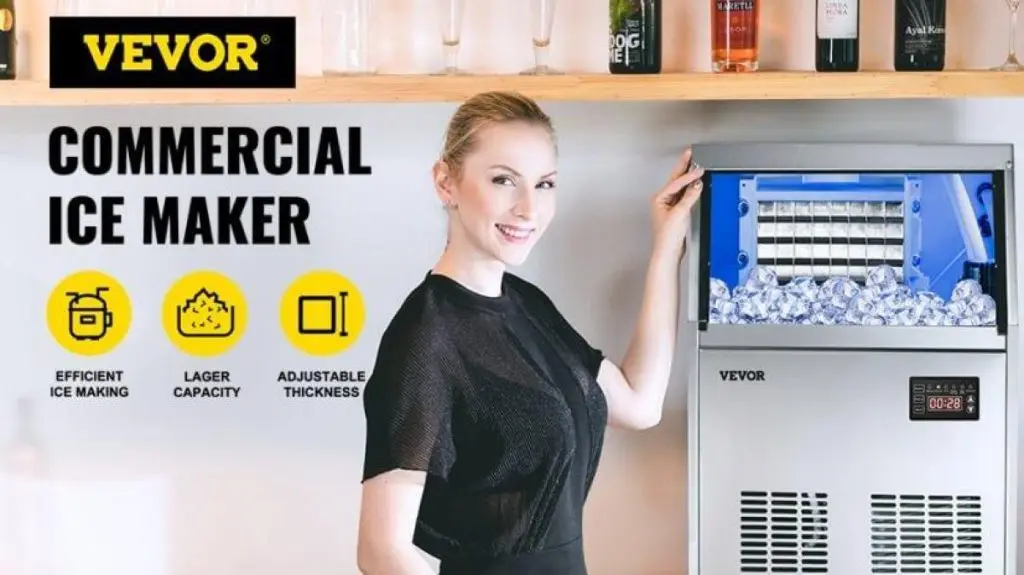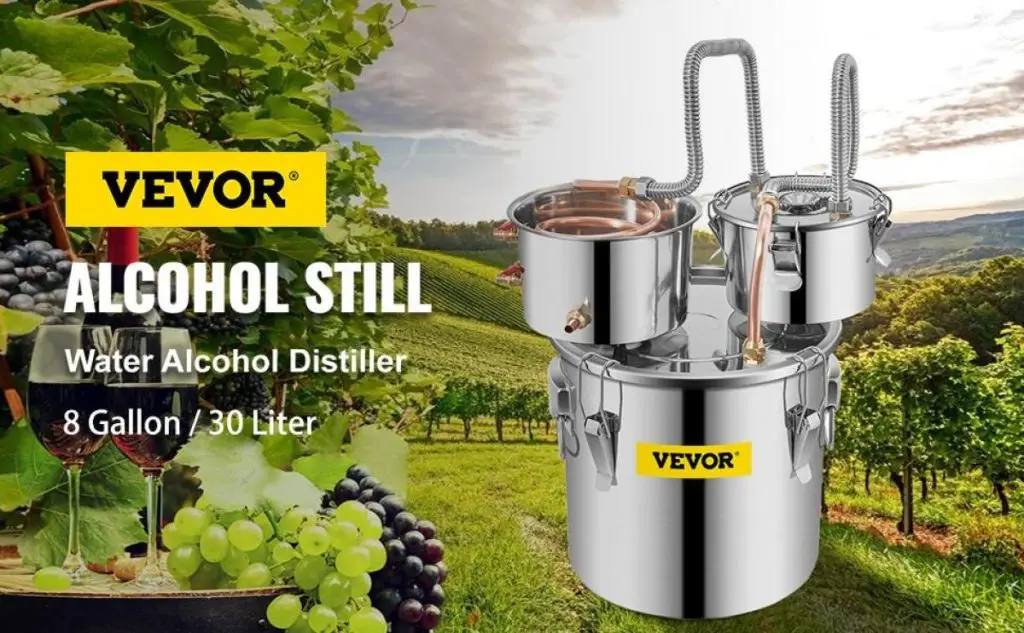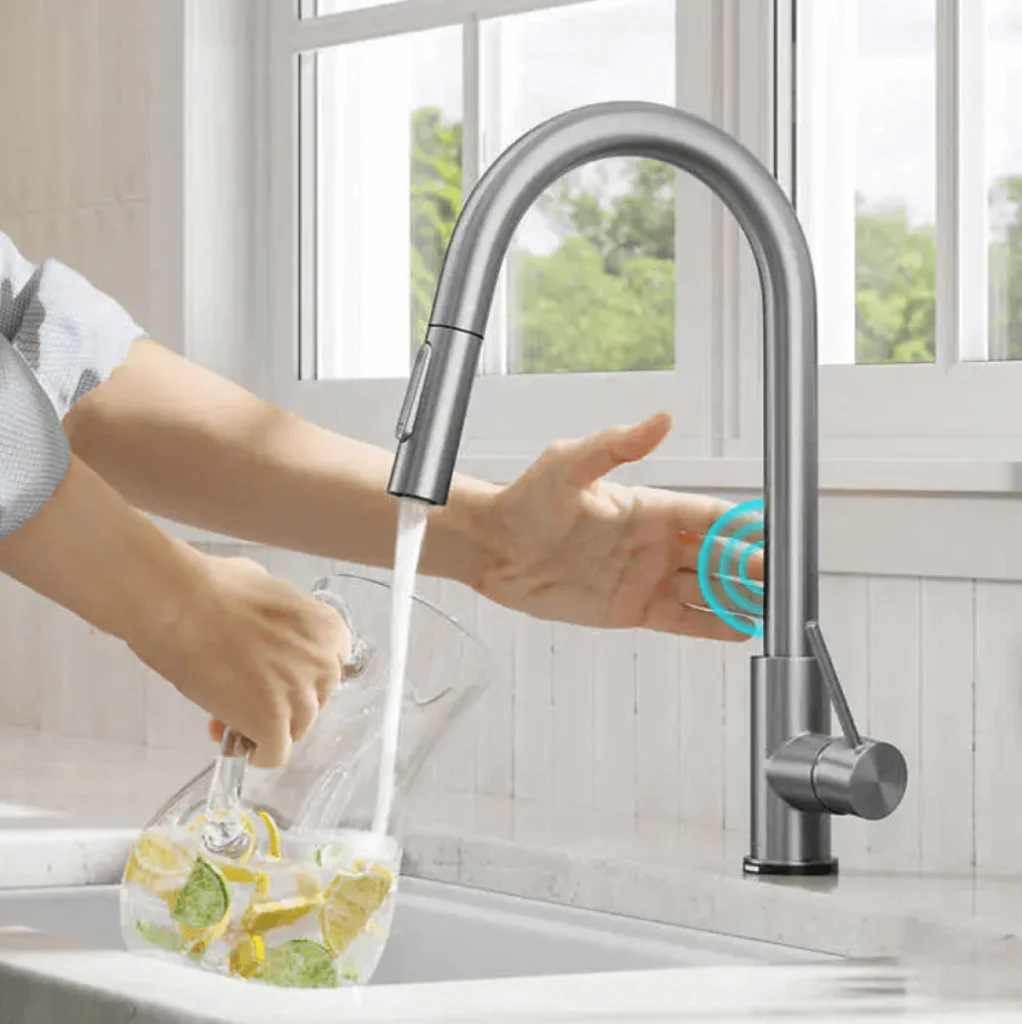Introduction
Do you wonder whether your cat will be fine drinking distilled water? This ambiguous subject may confuse you. It should be noted that cats, being fussy eaters, require careful thought regarding their hydration. But the question remains: Can cats drink distilled water? You may be confronted with conflicting information or need to learn the potential risks. Do not worry. This guide will walk you through the essentials of distilled water for cats. You will also be equipped with detailed information on distilled water’s pros and more. Let’s dive right in!
Table of contents
Understanding Distilled Water
Curious about “what is water distiller?” In a water distiller, the water goes through a very rigorous process of purification. The water boils, converting it into steam, and thus the impurities remain. The steam is then condensed into a liquid, giving you pure distilled water. The process eradicates the minerals, chemicals, and contaminants, leaving water with a high purity.
Pros:
Distilled water brings advantages, especially in medical equipment and lab tests. Its purity makes it suitable for some appliances, so minerals are not deposited. It would be better to drink distilled water for mineral-sensitive people or with a medical condition. In others, such as areas with bad water quality, it is a reliable substitute for drinking and cooking.
Cons:
While pure, distilled water appears to have no trace of minerals; therefore, its long-term consumption could threaten one`s health. Its mode of action is to leach minerals out of the body, which can cause imbalances. Moreover, others claim that missing minerals change the taste, making it less popular than regular consumption. Furthermore, the process is very energy-intensive and may be unsustainable on a massive scale.
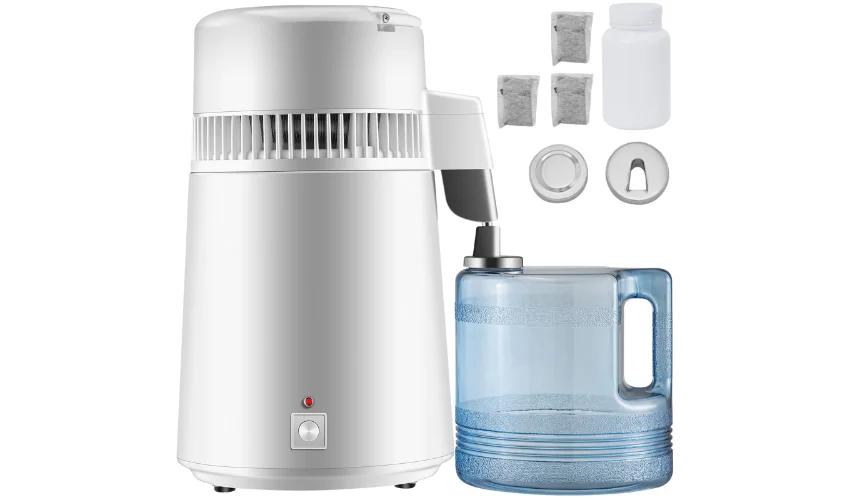
Cats and Hydration
Uncover the facts on the importance of water for cats, water sources you can use, and what causes dehydration in cats in the following section:
Importance of water for feline health
Consistently keeping your cat hydrated is critical for its health and wellness. Water performs several bodily functions, including digestion, circulation and temperature regulation. It is responsible for carrying nutrients, washing out wastes, and maintaining the good health of organs. Your cat might become dehydrated and face severe health problems with insufficient water. As a result, the provision of clean, fresh water is the key to keeping cats healthy.
Typical water sources for cats
Cats get water through their diet or drink directly from a source. In wet cat food, a considerable amount of moisture is contained to meet your cat’s daily hydration requirements. On top of that, cats usually drink water from their bowls, taps, or fountains. Some cats may additionally feel a strong urge to get running water, so their owners may seek water fountains to ensure they drink enough.
Cat dehydration symptoms
It becomes imperative to note the signs of dehydration for prompt remedies. The common signs are lethargy, dry or sticky gums, sunken eyes, loss of skin elasticity or reduced appetite. You may be alerted by less frequent urination or dense urine. If you notice these symptoms, immediately ensure your cat drinks water in plenty and book a consultation with your veterinarian. Dehydration can occur within a short time, and the situation may worsen in cats. Therefore you need to deal with early diagnosis and follow-up treatment to avoid the severe consequences.
Revealing Facts “Can Cats Drink Distilled Water?”
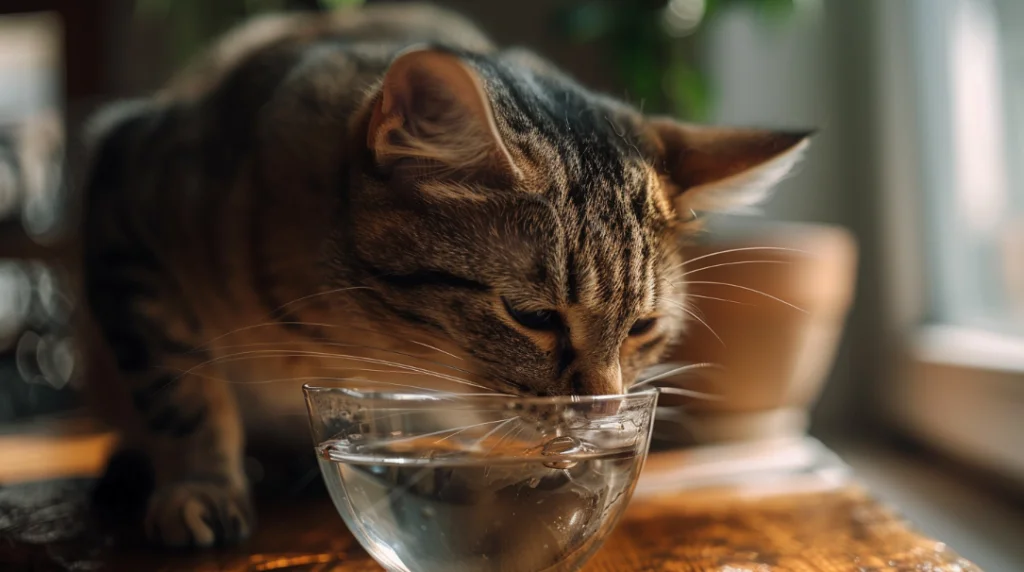
Know the answer to “Can Cats drink distilled water?” down below:
A. Research and the opinions of the experts.
As far as the question of whether Can Cats Drink Distilled Water? Is concerned, the experts’ answers can be seen as contradictory. Some veterinarians and pet nutritionists suggest providing purified water to cats only in specific cases; others warn about the risks. It is important to consider both sides of the argument and study the relevant research to decide your cat’s hydration needs.
B. Advantage of supplying distilled water to cats
Multiple advantages exist to giving your cat distilled water or can cats drink distilled water. Main advantages include:
Purity:
The boiling and condensation stage is also the process of distillation, which leaves behind most of the impurities and contaminants, ending up with incredibly pure water. This purity may work well for cats, especially those sensitive to chemical traces and pollution from water supplied by taps.
Reduced risk of toxins:
Trace elements of chlorine, fluoride, and also heavy metals may be present in the tap water, which could be harmful to your cat’s health in the long term. You remove the danger of exposing your cat to these dangerous chemicals by giving distilled water.
Suitable for certain health conditions:
Cats previously discovered to have unique health issues, including kidney or urinary tract problems, can be helped by drinking distilled water. Due to the high purity level and being composed of only minerals, it is easier for kidneys and can help prevent the formation of urinary crystals or stones.
Consistency:
Unlike tap water with variable constituents, distilled water lacks changes due to the source or treatment process. This stability is good for those felines with sensitive tummies or particular feeding requirements.
Prevention of dental issues:
Tap water contains minerals like calcium and magnesium, which can scale up a cat’s teeth to become tartar and plaque. With distilled water, you safeguard your cat from various dental diseases and maintain its oral health.
Reduced risk of urinary crystals:
Urinary crystals occur in cats and can provoke urinary tract infections or blockages that bring a lot of pain. Due to the lack of minerals, distilled water will not show the formation of these crystals, causing fewer urinary issues in sensitive cats.
Improved digestion:
Some cats can develop stomach upsets or diarrhea when drinking tap water due to its mineral contents or chlorine additives, among other factors. Distilled water is a clean, pure source of fluids that respects the delicate processes in the digestive system by improving the breakdown and absorption of nutrients
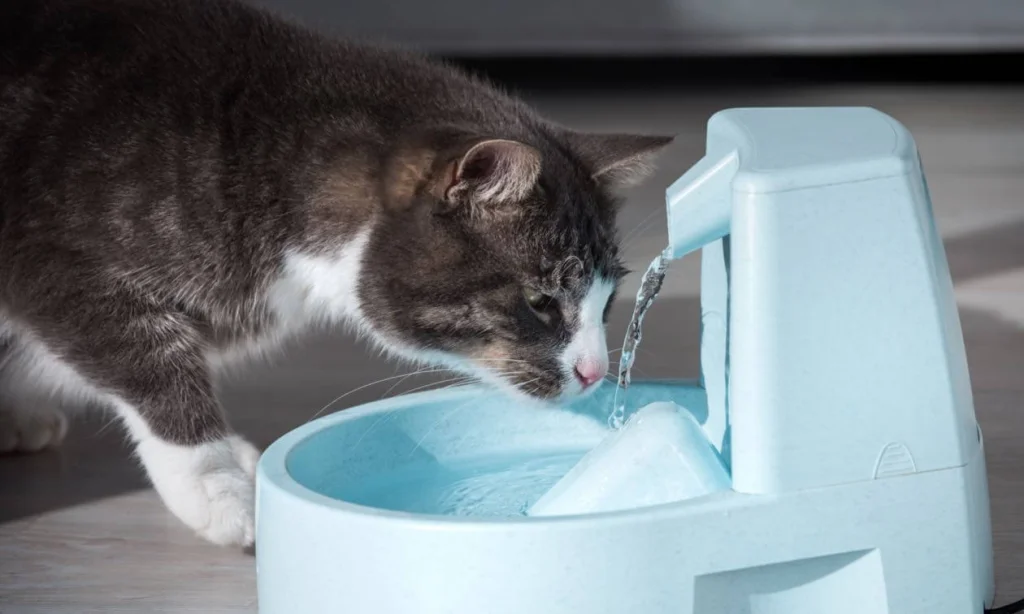
C. Cons of giving distilled water to cats
Lack of Minerals:
Distilled water has some cons besides pros when given to cats, such as:
In line with its name, pure water contains no traces of the required minerals like calcium and magnesium, which are vital for your cats to stay healthy and strong. The addition of this that might lead to seriously negative health effects cannot be overlooked. This risk may become the basis of different health issues if there aren’t enough nutrients in the diet.
Imbalance of Electrolyte:
For distilled water electrolytes, sodium and potassium, all of which are crucial, are non-existent. Electrolyte imbalance, consequently, might aggravate health problems.
Potential Nutritional Deficiencies:
Cats get additional minerals they need from the water supply. A constant diet based on distilled water may lead to nutritional imperfections in the biochemistry systems of cats. This may eventually lead to nutritional deficiencies.
Reduced Palatability:
Some cats may not enjoy the taste of chemicals-free distilled water, for it lacks mineral levels. Consequently, this can lower water consumption, resulting in dehydration.
A helpful suggestion would be to consult with your vet to assist you in arriving at an informed decision.
Alternatives to Distilled Water for Cats
Some alternatives exist against distilled water. Some of the options include:
Tap Water:
Water from the tap is readily available and typically safe for your cat to consume. However, it can be mixed with chlorine or fluoride in detectable quantities that some cats may not be able to tolerate. You can alleviate this by letting the water sit for a few hours to dissolve dissolved chemicals or using a water filter.
Filtered Water:
Water filtration can make it clean and fresh tasting, which may become more acceptable to your cat. Filtered water, a simple and cheap solution, hydrates your cat without the contaminants.
Spring Water:
Spring water is obtained from natural springs and usually involves little processing so it may be acceptable for cats. It lacks additives and has a crisp, fresh taste, which most cats relish. Nevertheless, do not forget the source and quality of spring water to avoid contaminants.
Bottled Water Options:
Many pet stores offer bottled water and add some minerals or flavors to induce the appetite of finicky cats. These choices could be handy but cost more than others.
Home-Prepared Electrolyte Solutions
For situations when your cat needs more water or electrolyte restoration, you can make simple, homemade solutions using water, salt, and sugar. Cats that are on their way to recovery or those dehydrated could serve as examples. When using the home-made remedy, make sure you are vet checked so that it is safe and appropriate for your cat.
Key Cat Hydration Recommendations
Main recommendations that you need to follow are:
- Providing clean and fresh water: Make sure your cat always has available clean water. Always clean the water bowl to avoid bacteria formation.
- Monitoring water intake: Ensure you notice how much water your cat drinks daily. Changes in hydration status are a sign of hidden health problems.
- Consult a veterinarian for water sources: Ask your vet for the correct water sources as an answer to “can cats drink distilled water’. They can give you individualized tips about your pet’s health and attitude.
Wondering about the best water distillers in the market? Uncover key ones below:
VEVOR 0.3G/H Water Distiller
Here comes the VEVOR 1.1 Gal Water Distiller, a dependable product that produces the purest water ever at your fingertips. Provided with a 0.3 gal. With an hour capacity and a 750W heating element, this unit is designed for effective water disinfection.
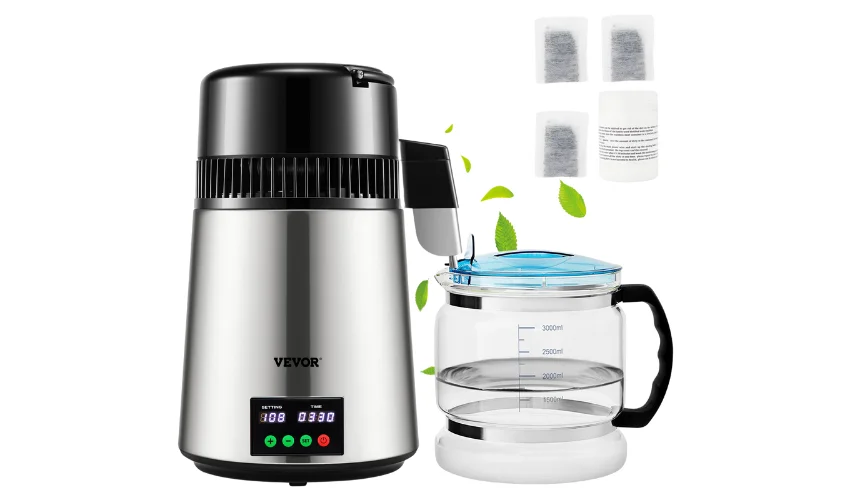
Efficient Water Purification
VEVOR home water distiller that produces 750W one liter per hour removes solids and contaminants for pure drinking water. It can make alcohol and essential oils and is suitable for multiple settings.
Upgraded Timing Function
The distiller includes a timing function that enables fermentation at a constant temperature (0-99 H). Set it to 3.5 hours for 1.1 Gal (4 L) to suppress limescale, which is desirable for alcohol and oil production.
Precise Temperature Display
Temperature display on the controller ranges from 30℃ to 108℃ for better distillation control. It features dry-burning protection that turns off at 115C or 150C.
Selected Materials & Fast Heat Dissipation
Prepared with food-grade 304 stainless steel for your safety, a glass carafe with a soft silicone buffer ensures durability. Speedy cooling of the aluminum fan and condensing coils.
User-Friendly Accessories
It is made up of cleaning agents and carbon packs. Easy tank cleaning. Water left after distillation doesn’t allow limescale deposits. Carbon pack brings out the water flavor.
VEVOR 1.5L/H Water Distiller
Welcome to the VEVOR 4L Water Distiller. This reliable water purifier provides distilled water. This one-liter-per-hour distiller has a timing function plus a dual-temperature display. Perfect for delivering clean water for several uses and having everything in an awesome, sleek silver design.
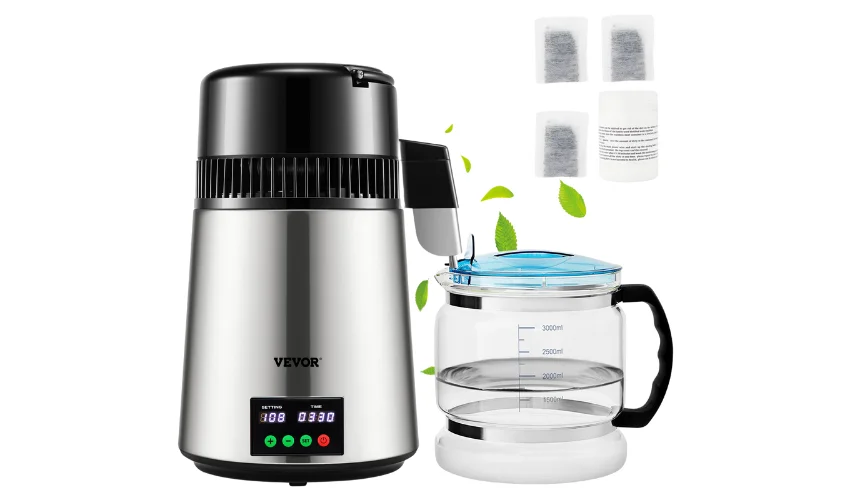
Faster Water Purification
VEVOR 1750W home water distiller at a production capacity of 0.4 Gal (1.5 L) per hour and 9.5 Gal (36 L) per day can effectively remove solids, VOCs, and impurities widely applicable in residential and industrial applications.
Upgraded Timing Function
It is characterized by a 0-99 heating function that enables constant temperature and is ideal for alcohol, basic oil, and hydrosol processing. By placing water at the bottom, limescale will be reduced as well.
Two Displays For Temperature
Displays both setting and actual temperatures (86°F to 226.4°F). There is an ℉/℃ button for simple tracking. Dry-burn protection prevents mishaps and switches itself off at 239℉ (115℃) and 302℉ (150℃).
Quick Dissipation of Heat
Constructed from food-grade 304 stainless steel, ensuring safety. The glass carafe with silicone buffer is designed to ensure durability. Instant heat dissipation is ensured by the 4-blade aluminum fan and the SUS 304 condensing coil.
Beginner Friendly
Comes with a powder cleaner and three replaceable carbon filters for convenient maintenance. Residual water after distillation prevents limescale formations. The carbon pack is installed at the water outlet, purifying water and improving taste.
You can read more on how to clean a water distiller. This is essential if you have one and want to make it last longer.
FAQs
Some of the frequently asked questions on the topic “Can cats drink distilled water?” are as follows:
Should cats drink tap water or bottled water?
Cats should be given a clean, fresh water. Keep the water bowl clean to prevent bacteria accumulation.
Is it allowed to provide cats with tap water?
Regular tap water is usually okay for cats to drink unless it is contaminated. However, some cats may like filtered water so as not to get any chemicals or strange smells.
What is a viable water alternative for cats?
Cats may also catch some water from their wet food, giving them the extra water needed. You may provide diluted bone broth or water with a little tuna juice and see how it responds.
Do animals need distilled water?
Like all other animals, pets could do well with tap water unless an animal doctor prescribes distilled water for specific health reasons. No minerals are present in distilled water. Therefore, it is not recommended to provide long-term hydration.
Which water is good for a cat bath?
For cat baths, make sure to use tepid water only. Be sure not to use very cold or very hot water.
Conclusion
In a nutshell, the investigation of whether “Can cats drink distilled water?” gives an insight into the significance of knowing the hydration requirements of felines. As a pet owner, you should ensure the cat’s health by giving it daily fresh and clean water. The right water distiller will keep the purity of your pet’s water supply channel. If you are in search of sturdy and precise distillers, do not hesitate to check VEVOR water distiller products. Start safeguarding your cat’s health and vitality by selecting the ideal water distiller today. Your fuzzy family member deserves the best, VEVOR is here for you to help by making the selection easy.

